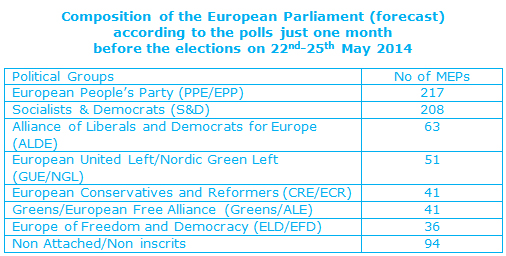Elections in Europe
Corinne Deloy
-

Available versions :
EN

Corinne Deloy
382 million citizens from 28 countries of the European Union are being called to ballot from 22nd to 25th May next to renew the Parliament whose HQ is in Strasbourg, and which is the only European institution to be appointed by direct universal suffrage. The Netherlands and the UK will be voting on 22nd May, Ireland on 23rd; Latvia, Slovakia and Malta will vote on 24th May. The Czech Republic will go to ballot on 23rd and 24th; Italy 24th and 25th May. The other 20 Member States will be appointing their MEPs on 25th May. In all 751 MEPs will be elected for a five year period during this election whilst the Strasbourg Assembly has 766 members today. Germany is the country with the most MEPs (99) but which will also lose the most due to the Lisbon Treaty (-3). Romania, Greece, Belgium, Portugal, Czech Republic, Hungary, Austria, Bulgaria, Ireland, Croatia and Lithuania will each lose an MEP. The other Member States will all retain the same number of MEPs. The minimum number of MEPs is 6 (Malta, Cyprus, Estonia and Luxembourg).
The European elections are the source of concern in many Member States. Many political leaders and analysts are anticipating both a further decline in turnout and a rise in the number of votes given to populist movements, on the left and the right.
The economic situation (45%), unemployment (36%) and the state of public finances (26%), these are the three main issues that the EU faces according to its citizens[1]. We might note that the elements quoted are the same on a national and personal level: asked to pick out the three main problems facing their country or even their own personal concerns Europeans point to unemployment, the economic situation and rising prices.
Never have European issues, notably the debt crisis and that of the euro zone, been as topical as they have over the last five years when they formed the focus of debate in every Union country. The Union is deemed to be the most apt player to act effectively against the effects of the financial and economic crisis (22%, on a par with national government)[2].
In this context and considering the increasing role played by Strasbourg in European decision making the elections on 22nd-25th May next should become a major European venue.
Institutional Novelty
The European elections on 22nd-25th May 2014 will be different from all of those that have preceded it. The adoption of the Lisbon Treaty in 2009 indeed allows European citizens to "elect" the president of the Brussels Commission for the first time. The text (Article 17.7) obliges the European Council to take on board the results of the European elections when it chooses the person that it wants in the position of President of the Commission; the Council's candidate will then be submitted to a vote by the MEPs[3]. By personalising the election - which links the appointment of the future president of the Commission to the citizens' vote - the aim is to make the European elections more legible and more real in the eyes of the electorate.
As a result, for the first time ever, each of the European parties is putting forward its own candidate for the post of President of the European Commission.
The European People's Party (EPP) - whose programme is available on http://juncker.epp.eu/epp-manifesto - appointed (61% of the vote) former Luxembourg Prime Minister (1995-2103) and former Eurogroup President Jean-Claude Juncker (Social-Christian Party, PCS/CVS) http://juncker.epp.eu/ as its candidate for the presidency of the Commission during its congress in Dublin on 6th and 7th March 2014.
Martin Schulz (Social Democratic Party SPD), present President of the European Parliament is the lead candidate for the Party of European Socialists (PES) in the May election. Its programme is available on http://d3n8a8pro7vhmx.cloudfront.net... he was officially selected during his party's congress on 1st March in Rome. http://www.martin-schulz.eu/
The Alliance of Liberals and Democrats for Europe (ALDE) http://www.aldeparty.eu/... and the European Democratic Party (EDP) chose former Belgian Prime Minister (1999-2008) and present chairman of the ALDE group in the European Parliament Verhofstadt (Flemish Liberals and Democrats, Open VLD) at the Brussels Congress on 1st February 2014. http://www.guyverhofstadt.eu/
The European Green Party whose programme is available on http://europeangreens.eu/... organised primary elections from November 2013 to January 2014 open to all European Union citizens aged 16 and over for them to choose their candidate. 23,000 people took part and appointed the duo comprising José Bové (Europe Ecology-The Greens, EE-LV) and Franziska Keller (The Greens, DG), both MEPs since 2009. http://campaign.europeangreens.eu/ska-keller and http://campaign.europeangreens.eu/jose-bove
Finally Alexis Tsipras (Radical Left Coalition, SYRIZA) is the European Left Party (GUE) candidate whose programme is available on http://de.european-left.org.... He was chosen during a congress in Madrid on 15th December 2013. http://european-left.org/tags/alexis-tsipras
The Alliance of European Conservatives and Reformers (AECR) and the European Alliance for Freedom have chosen not to put any candidate forward. The former explained that it had done this because it was against the Lisbon Treaty. "We shall not play the game of pretending that there is a European electorate," declared Daniel Hannan (Conservative Party, Cons). "We hope to speak on behalf of a great majority of Europeans who never agreed to become citizens of a federal union," indicated Jan Zahradil for this party (Democratic-Civic Party, ODS).
"We are not putting a candidate forward because we do not have anyone competent but because we do not want to deceive the citizens. There is no European list or European candidate for whom people can vote. It is just a recommendation that the Council is not obliged to follow. We do not want to take part in this false, dishonest democracy," said MEP Franz Obermayr (Liberal Party, FPÖ, AT) in justification of the choice made by the European Alliance for Freedom.
Several televised debates are planned to take place between the different candidates for the Presidency of the European Commission. The first brought together Jean-Claude Juncker and Martin Schulz on 9th April last[4]. In the next one programmed for 28th April all of the candidates will be present. The EPP and PES candidates will come face to face twice, on 8th and 20th May and the six candidates will debate again together on 9th and 15th May.
Turnout: an inexorable decline?
With each election for the European Parliament there has been a significant decline in turnout. In 1979 63% voted; 20 years later less than half of the electorate (49.80%) turned out to vote. Finally five years ago just over four people in ten (43%) went to vote. Turnout in European elections has always been lower than that seen in national elections in the 28 Member States, except in countries where it is obligatory to vote. Although the rise in abstention bears witness to a wider crisis in terms of representative democracy, it remains that the European election struggles to mobilise the citizens.
In a bid to raise turnout the European elections have been brought forward this time in order to avoid the situation in which many voters are already on summer holiday. Several Member States (Germany, Ireland, Greece, Lithuania, Italy, UK) have also chosen to link the election with another (regional, local, national parliamentarian or presidential), a measure that makes it generally easier to reduce abstention but at the risk of confusing the reasons for the election.
The heterogeneous nature of the rules (minimum voting age, number of constituencies, distribution of seats, incompatibility in terms of accumulating mandates etc...) likewise the electoral offer and the lack of any real "European campaign" are all a handicap to a certain degree.
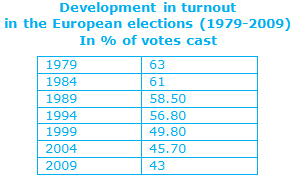
What about the sanction vote?
The European elections are being organised at different moments in the national cycle of each of the Member States except in Belgium. An intermediary election and often considered secondary, it often gives rise to the expression of discontent on the part of some voters and is sometimes the occasion for the latter to punish the government in office. However this trend should not be exaggerated. Although in 2004 voters sanctioned those in office in half of the Member States (13 out of 25), four years later only 10 countries of the 27 experienced a sanction vote. Of course this is less likely to occur in countries which have recently held national elections (Germany, Austria, Hungary, Bulgaria, Luxembourg, Czech Republic, Slovakia and Lithuania).
Regarding the upcoming European election a sanction vote may occur in nine Member States: Bulgaria, Denmark, Estonia, France, Greece, Netherlands, UK, Slovenia, Sweden.
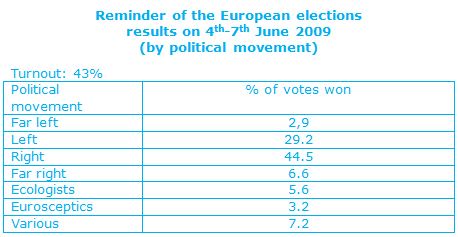
The last European elections on 4th-7th June 2009 witnessed an overwhelming victory for the right. The right and far right together won half of the vote (51.10%) with the left only winning one third (32.40%).
This year the election is due to be a great deal closer. According to the polls the left and the right are almost running neck and neck. The EPP and the Socialists & Democrats (S&D) are running almost equal with a slight advantage given to the EPP in the latest polls.
The ecologists in the groups of Greens/European Free Alliance (Greens/EFA) and the Alliance of Liberals and Democrats for Europe are losing ground in the polls.
According to the polls (see the end of the text) the right is due to take the lead in 13 Member States: Germany, Austria, Belgium, Cyprus, Denmark, Finland, France, Hungary, Ireland, Luxembourg, Netherlands, Poland and Slovenia. The left is due to win in 12 Member States: Croatia, Estonia, Greece, Italy, Latvia, Lithuania, Malta, Portugal, Romania, UK, Slovakia and Sweden. The situation is undecided in Bulgaria and Spain. In the Czech Republic the populist movement Ano 2011 is due to win.
Victory forecast for the populists
The results of the most recent elections in the Member States and the polls show that the populist parties are due to gain in strength during the European elections on 22nd-25th May next. They may double their number and reach almost 200 MEPs in the Strasbourg assembly, i.e. just over one quarter of the total. The European United Left/Nordic Green Left may therefore become the third most important political force in parliament.
Some populist parties may win the election in several Member States: the National Front (FN) in France, the Danish People's Party (DF), the Radical Left Coalition (SYRIZA) in Greece, Ano 2011 in the Czech Republic, and even the UK Independence Party in the UK (UKIP). The victory of a populist party would undeniably be detrimental to the country concerned and contribute towards diminishing its influence within the Union. Other parties may win a great number of votes: the Liberal Party in Austria (FPÖ), the New Flemish Alliance (N-VA) in Belgium, the Five Stars Movement (M5s) in Italy, the True Finns (PS), the Communist Party of Bohemia and Moravia (KSCM) in the Czech Republic and the Freedom Party (PVV) in the Netherlands and Jobbik in Hungary.
The populists form an extremely heterogeneous group of parties ranging from the far right (favourable to a return to the Nation-State) to the far left (against the European Union which it accuses of being neoliberal). Their degree of opposition to the Union is variable. Some parties are europhobic: hostile to the European project, they want their country to withdraw from the Union (Front National, UK Independence Party, Freedom Party). Others are Eurosceptic and are "only" against certain European decisions or certain Union policies. All see Brussels as the vector of globalisation. Standing as the only real alternative path both on the right and the left, the populists share common ground in terms of their criticism of the elites, the challenge made to the mode of representation and the intermediary bodies and the valorisation of the national dimension (or regional dimension as in Italy, Belgium and even Spain). The rightwing populists reject "mass immigration" and the "Islamisation of Europe."
Further opposition has emerged against the European Union due to the economic crisis in some Member States. In the north the Alternative for Germany (AfD) accuses Brussels of forcing the Germans to pay for the countries in difficulty; in the south the Five Stars Movement led by Beppe Grillo believes that Berlin is responsible for the austerity policy that has been forced on Italy.
The 99 populist MEPs are today divided into two groups in the European Parliament (31 in the European of Freedom and Democracy (EFD) and 35 in the European United Left/Nordic Green Left) whilst one third (33) of them sit amongst the non-inscrits[5]. Their lack of cohesion and therefore their inability to form coalitions is a real handicap to them within this institution which functions on the base of negotiation and compromise. In November 2013 several rightwing populist movements - the PVV (Netherlands), the FPÖ (Austria), the FN (France) , the Vlaams Belang (Belgium), the Swedish Democrats (DS), the Northern Leage (LN) (Italy) and the Slovakian National Party (SNS) - decided to join forces in view of the May election in a bid to try and form one group in the future European parliament. To do this they will have to rally a minimum of 25 MEPs from at least one quarter of the Member States (ie 7 countries). Having a group would enable them to have more influence in the debates and to defend their ideas better - they would also benefit from speaking time proportional to their size as well as financial and material means.
The populist vote in the European elections totalled 9.8% in 1994; it totalled 14.4% ten years later, its record to date 12.7% was achieved in the last election in 2009. In part this can be explained by the proportional voting method in force in the appointment of MEPs which enables a greater expression of discontent.
Although the protest vote is not new the ability of some populist parties to federate the discontented thanks to a recent development in their ideological positioning (social discourse in defence of protectionism and the Welfare State - for nationals - on the one hand; defence of principles of living together in Europe - tolerance, freedom of expression, gender equality and women's emancipation, secularity etc... on the other) is unprecedented today however.
"The new European Parliament will be Eurosceptic and different. It will be lively. There will be a great deal of noise, I think," declared UKIP leader Nigel Farage to the daily "Le Monde" on 21st April 2014. The electorate has been warned.
To find out more about the lists running, the parties' electoral programmes, voting rules, a reminder of the 2009 results in each Member State, the Foundation has opened a site devoted to the elections http://elections-europeennes.robert-schuman.eu/en and the Apps "Euroepan Elections" available for free on AppStore and Google
The most recent polls in the Member States
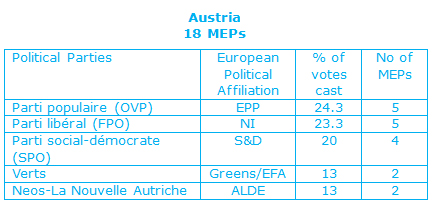 http://elections-europeennes.robert-schuman.eu/en/fiche/autriche/
http://elections-europeennes.robert-schuman.eu/en/fiche/autriche/
Source : http://www.electio2014.eu/fr/pollsandscenarios/polls
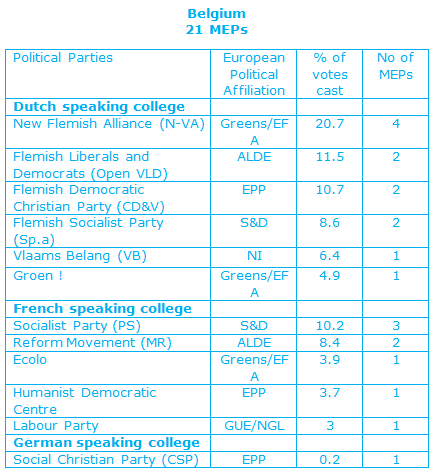 http://elections-europeennes.robert-schuman.eu/en/fiche/belgique/
http://elections-europeennes.robert-schuman.eu/en/fiche/belgique/
Source : http://www.electio2014.eu/fr/pollsandscenarios/polls
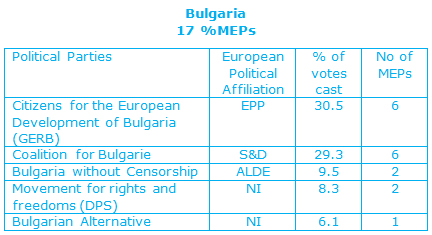 http://elections-europeennes.robert-schuman.eu/en/fiche/bulgarie/
http://elections-europeennes.robert-schuman.eu/en/fiche/bulgarie/
Source : http://www.electio2014.eu/fr/pollsandscenarios/polls
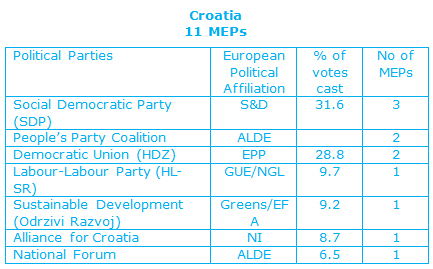 http://elections-europeennes.robert-schuman.eu/en/fiche/croatie/
http://elections-europeennes.robert-schuman.eu/en/fiche/croatie/
Source : http://www.electio2014.eu/fr/pollsandscenarios/polls
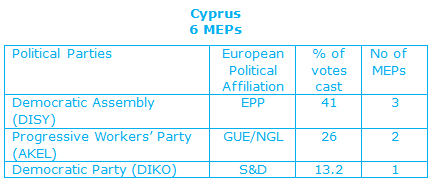 http://elections-europeennes.robert-schuman.eu/en/fiche/chypre/
http://elections-europeennes.robert-schuman.eu/en/fiche/chypre/
Source : http://www.electio2014.eu/fr/pollsandscenarios/polls
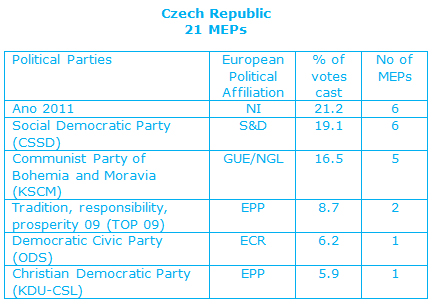 http://elections-europeennes.robert-schuman.eu/en/fiche/republique-tcheque/
http://elections-europeennes.robert-schuman.eu/en/fiche/republique-tcheque/
Source : http://www.electio2014.eu/fr/pollsandscenarios/polls
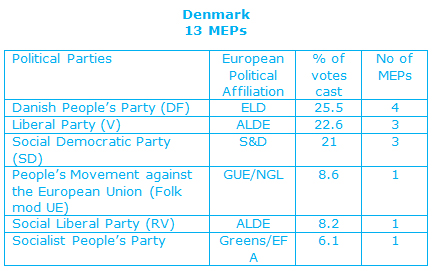 http://elections-europeennes.robert-schuman.eu/en/fiche/danemark/
http://elections-europeennes.robert-schuman.eu/en/fiche/danemark/
Source : http://www.electio2014.eu/fr/pollsandscenarios/polls
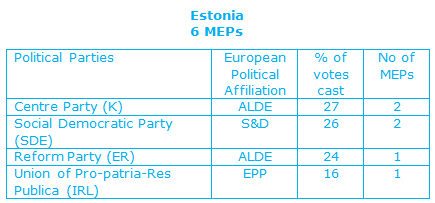 http://elections-europeennes.robert-schuman.eu/en/fiche/estonie/
http://elections-europeennes.robert-schuman.eu/en/fiche/estonie/
Source : http://www.electio2014.eu/fr/pollsandscenarios/polls
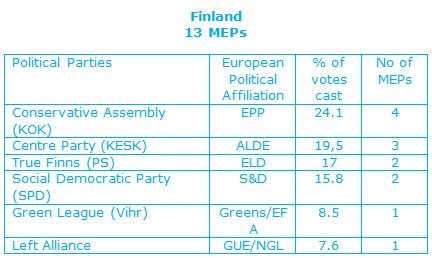 http://elections-europeennes.robert-schuman.eu/en/fiche/finlande/
http://elections-europeennes.robert-schuman.eu/en/fiche/finlande/
Source : http://www.verkkouutiset.fi/eurovaalit/il%20eurovaalimittaus-19193
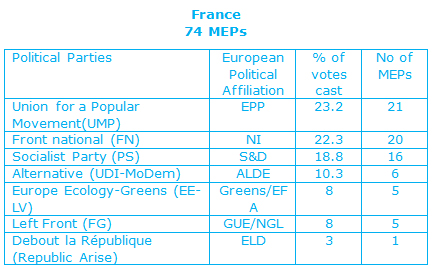 http://elections-europeennes.robert-schuman.eu/en/fiche/france/
http://elections-europeennes.robert-schuman.eu/en/fiche/france/
Source : http://www.electio2014.eu/fr/pollsandscenarios/polls
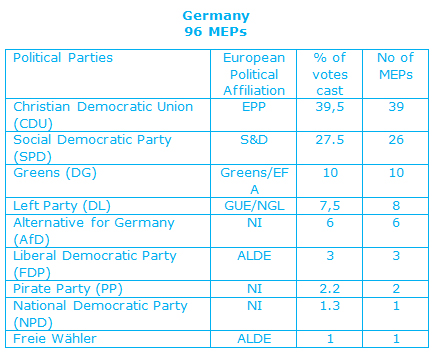 http://elections-europeennes.robert-schuman.eu/en/fiche/allemagne/
http://elections-europeennes.robert-schuman.eu/en/fiche/allemagne/
There is no longer a minimum threshold in Germany since the Constitutional Court of Karlsruhe's decision
Source : http://www.electio2014.eu/fr/pollsandscenarios/polls
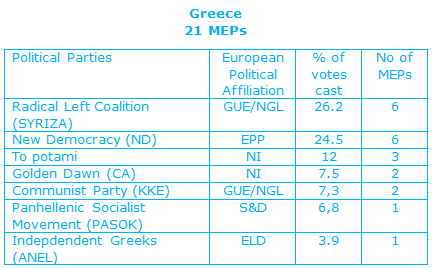 http://elections-europeennes.robert-schuman.eu/en/fiche/grece/
http://elections-europeennes.robert-schuman.eu/en/fiche/grece/
Source : http://www.electio2014.eu/fr/pollsandscenarios/polls
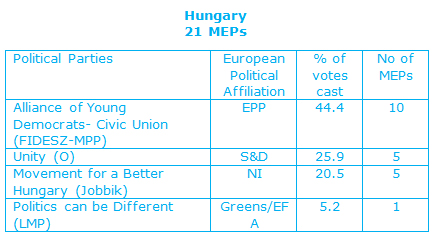 http://elections-europeennes.robert-schuman.eu/en/fiche/hongrie/
http://elections-europeennes.robert-schuman.eu/en/fiche/hongrie/
Source : http://www.electio2014.eu/fr/pollsandscenarios/polls
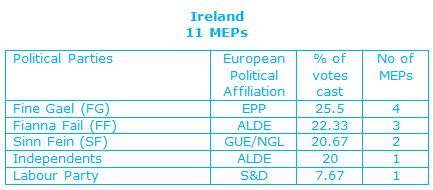 http://elections-europeennes.robert-schuman.eu/en/fiche/irlande/
http://elections-europeennes.robert-schuman.eu/en/fiche/irlande/
Source : http://www.electio2014.eu/fr/pollsandscenarios/polls
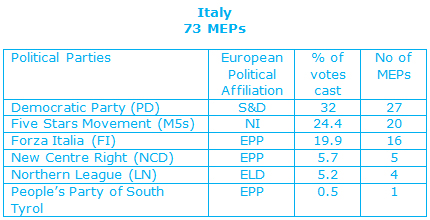 http://elections-europeennes.robert-schuman.eu/en/fiche/italie/
http://elections-europeennes.robert-schuman.eu/en/fiche/italie/
Source : http://www.electio2014.eu/fr/pollsandscenarios/polls
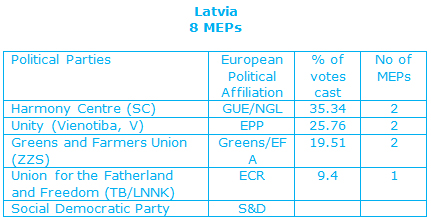 http://elections-europeennes.robert-schuman.eu/en/fiche/lettonie/
http://elections-europeennes.robert-schuman.eu/en/fiche/lettonie/
Source : http://www.electio2014.eu/fr/pollsandscenarios/polls
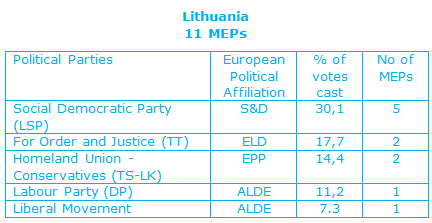 http://elections-europeennes.robert-schuman.eu/en/fiche/lituanie/
http://elections-europeennes.robert-schuman.eu/en/fiche/lituanie/
Source : http://www.electio2014.eu/fr/pollsandscenarios/polls
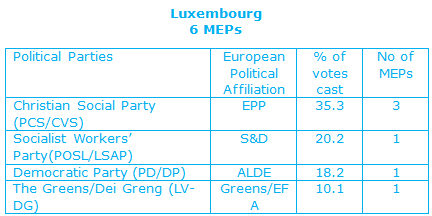 http://elections-europeennes.robert-schuman.eu/en/fiche/luxembourg/
http://elections-europeennes.robert-schuman.eu/en/fiche/luxembourg/
Source : http://www.electio2014.eu/fr/pollsandscenarios/polls
 http://elections-europeennes.robert-schuman.eu/en/fiche/malte/
http://elections-europeennes.robert-schuman.eu/en/fiche/malte/
Source : http://www.electio2014.eu/fr/pollsandscenarios/polls
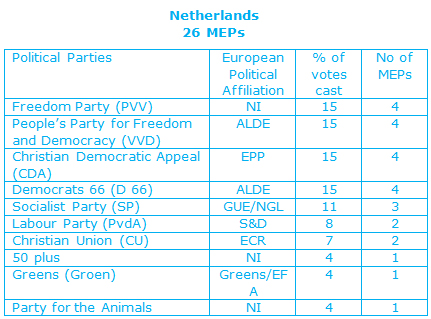 http://elections-europeennes.robert-schuman.eu/en/fiche/pays-bas/
http://elections-europeennes.robert-schuman.eu/en/fiche/pays-bas/
Source : http://www.electio2014.eu/fr/pollsandscenarios/polls
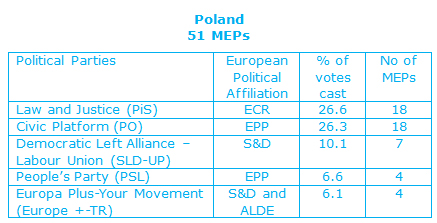 http://elections-europeennes.robert-schuman.eu/en/fiche/pologne/
http://elections-europeennes.robert-schuman.eu/en/fiche/pologne/
Source : http://www.electio2014.eu/fr/pollsandscenarios/polls
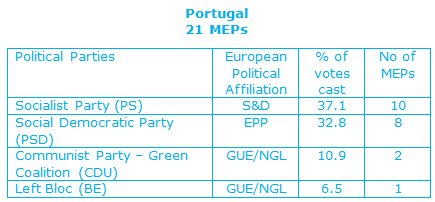 http://elections-europeennes.robert-schuman.eu/en/fiche/portugal/
http://elections-europeennes.robert-schuman.eu/en/fiche/portugal/
Source : http://www.electio2014.eu/fr/pollsandscenarios/polls
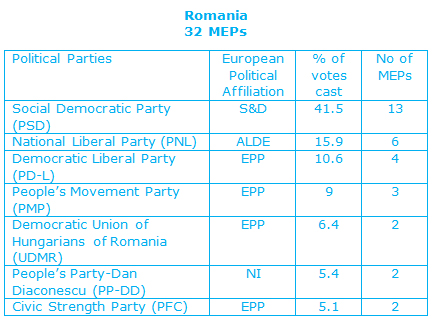 http://elections-europeennes.robert-schuman.eu/en/fiche/roumanie/
http://elections-europeennes.robert-schuman.eu/en/fiche/roumanie/
Source : http://www.electio2014.eu/fr/pollsandscenarios/polls
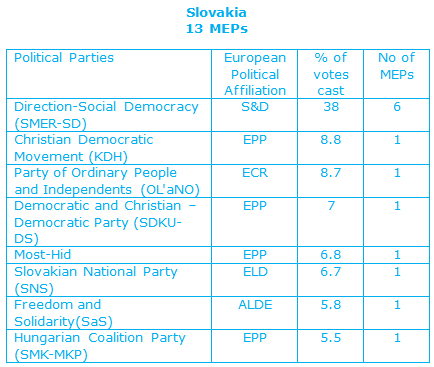 http://elections-europeennes.robert-schuman.eu/en/fiche/slovaquie/
http://elections-europeennes.robert-schuman.eu/en/fiche/slovaquie/
Source : http://www.electio2014.eu/fr/pollsandscenarios/polls
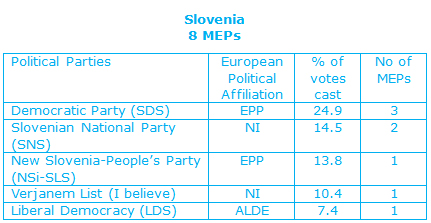 http://elections-europeennes.robert-schuman.eu/en/fiche/slovenie/
http://elections-europeennes.robert-schuman.eu/en/fiche/slovenie/
Source : http://www.electio2014.eu/fr/pollsandscenarios/polls
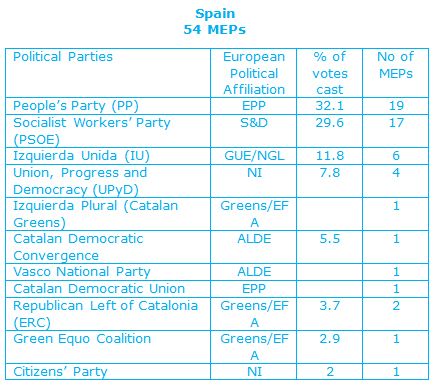 http://elections-europeennes.robert-schuman.eu/en/fiche/espagne/
http://elections-europeennes.robert-schuman.eu/en/fiche/espagne/
Source : http://www.electio2014.eu/fr/pollsandscenarios/polls
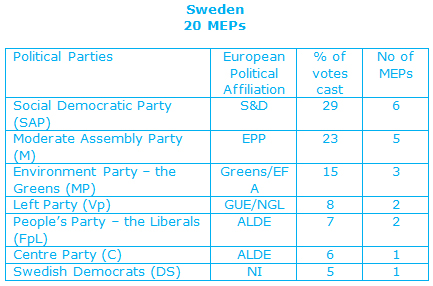 http://elections-europeennes.robert-schuman.eu/en/fiche/suede/
http://elections-europeennes.robert-schuman.eu/en/fiche/suede/
Source : http://www.electio2014.eu/fr/pollsandscenarios/polls
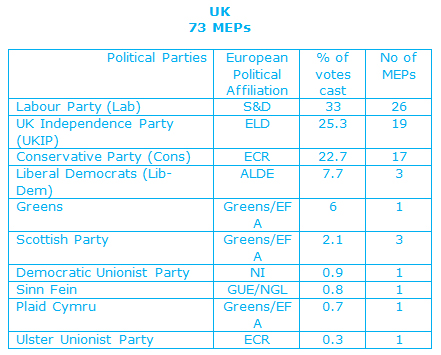 http://elections-europeennes.robert-schuman.eu/en/fiche/royaume-uni/
http://elections-europeennes.robert-schuman.eu/en/fiche/royaume-uni/
Source : http://www.electio2014.eu/fr/pollsandscenarios/polls
With Albert Aixala, Linda Berg, Karolien de Bruyn, Marie Demker, Jacob Christensen, Stellina Galitopoulou, Inga Groth, Alenka Krasovec, Rodolphe Laffranque, Helen Levy, Lukas Macek, Silviu Matei, Grigorij Meseznikov, Augsute Meskyte, Patrick Moreau, Philippe Poirier, Julia Ravaityte, Antti Timonen, Antony Todorov, Hanna Wass
On the same theme
To go further
Elections in Europe
Corinne Deloy
—
15 April 2025
Elections in Europe
Corinne Deloy
—
25 February 2025
Elections in Europe
Corinne Deloy
—
18 February 2025
Elections in Europe
Corinne Deloy
—
28 January 2025

The Letter
Schuman
European news of the week
Unique in its genre, with its 200,000 subscribers and its editions in 6 languages (French, English, German, Spanish, Polish and Ukrainian), it has brought to you, for 15 years, a summary of European news, more needed now than ever
Versions :

